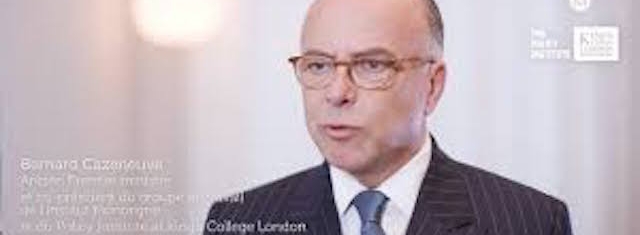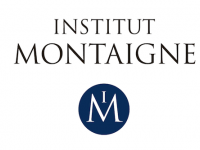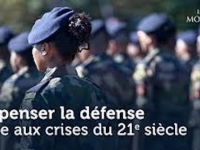Politics
INSTITUT MONTAIGNE RECOMMENDS 12 GUIDELINES FOR EUROPE DEFENCE COOPERATION
BY FORMER PM B. CASZENEUVE & N. BAVEREZ

Former M B. CAzeneuve Head Institut Montaigne (Source: Institut Montaigne)
USPA NEWS -
« Europe is facing an accumulation of crises and threats, of an increasingly diversified nature. It is becoming imperative to strengthen our security and resilience. These no longer solely depend on the robustness of our defense system. A more comprehensive and agile approach is from now on necessary, with a scope ranging from diplomatic, military, economic, political and informational dimensions to social and sanitary ones. The COVID-19 crisis has made this clear. » We publish the latest study, released buy Institut Montaigne, co-chaired by former French PM Bernard Cazeneuve and Nicolas Baverez, lawyer, economist and contributor on defense issues at Institut Montaigne, Institut Montaigne´s taskforce recommends 12 guidelines based on 3 main levers: preparing our armed forces for tougher conflicts, adopting a global & more agile approach facing the hybridity of threats and continuing to prioritize European defence cooperation.Institut Montaigne is an independent think tank dedicated to public policy in France and Europe, founded in 2000 , based in Paris, its work is the result of a rigorous, critical and open method of analysis based on international comparisons."Institut Montaigne
Faced with renewed strategic threats and the multiplication of crises, it is essential to strengthen the security of France and Europe. After Brexit, our country has a special responsibility because of its nuclear deterrent and its complete model of army, which are major assets. Armies are an essential element of the nation's resilience and sovereignty, the importance of which has been underlined by the Covid epidemic. That is why it is fundamental to continue their modernization and to preserve our defense industry by continuing the financial effort provided for in the Military Programming Law through an investment of 295 billion euros between 2019 and 2025“ the co-chairs of Institut Montaigne´s task force, former PM Cazeneuve and co-chair and M. Nicolas Baverez, claim.
AN UNSTABLE GEOPOLITICAL CONTEXT MARKED BY DIVERSE THREATS ON THE RISE----------------------------
Over the past two decades, the risks and threats facing France and Europe have increased and diversified: financial crisis, cyber attacks, Islamist terrorism, pandemic, information manipulation, foreign investment in strategic sectors, the return of military powers. The quick succession of these shocks increases the risk of a systemic crisis and requires the reinforcement of our resilience."
PRESERVING THE ROLE OF THE ARMY -----------------------------------------------------------------------------------------------
"Armies can contribute to solve non-military crises on national territory, as illustrated by “Opérations Sentinelle et Résilience“, following terrorist attacks, on the one hand, or their actions during the health crisis, on the other. However, the accumulation of various crises does not preclude the possibility of a major conflict in the coming years. It is above all in this kind of scenario that the means of the Army are rather designed, as they commit heavy, costly and limited resources with potentially lethal effects. If the mobilisation of the Armed Forces is relevant to respond to non-military issues, it must be conceived in a role of reinsurance and not as a "Swiss army knife". The Armed Forces and their responsiveness must be strengthened in order to allow them to deal with what they have best been adapted to do. To achieve this, several levers can be used:
-the funding lever, which should not be reduced in the coming years, despite the economic context;
-the human resources lever, in order to strengthen the attractiveness of the military career;
-the innovation lever, on which significant progress still needs to be made.
ADOPTING A GLOBAL AND MORE AGIL APPROACH-------------------------------------------------------------------------------
"Given the increasingly hybrid nature of the threats we face, the security of European people no longer solely depends on the robustness of our defense. Instead, it must be based on a more global approach that needs to include many dimensions (diplomatic, military, economic, political, informational, sanitary, social). The answer to the accumulation of crises must be global and more agile, with a greater ability to anticipate risks, absorb shocks and bounce back. The action must be carried out in a concerted manner between public and private players, naturally focused on the long term: the State as strategist, but also research centres and think tanks, insurers and NGOs. We also need to improve our preparation, by building-up robust crisis management strategies and training. Finally, the increasingly multi-dimensional nature of crises, such as COVID-19, requires more coordination: between ministries, on one hand, and between the central state and the different local authorities, on the other.
PRIORITIZING EUROPEAN COOPERATION--------------------------------------------------------------------------------------------
"France does not carry much weight in a strategic context marked by confrontations between great powers, such as the Sino-American rivalry. The only answer lies within European cooperation. Similarly, while some areas are a matter for national strategic autonomy, others such as digital or space related issues should be addressed at the level of the European Union. European strategic autonomy must be deepened in its three traditional components - political, operational, technological and industrial - but also extended to the economic, financial and commercial fields.--------------------------------------------------------
France's singular position in this area is nevertheless often misunderstood by our European partners. This is particularly the case on the NATO issue, which is today a major sticking point. It is necessary to precise and clarify our discourse and also to present it to Brussels and to the European capitals, in order to federate more. This also means taking better account of the perspectives of France´s partners on these subjects, first and foremost Germany, because only a common Franco-German vision will lead the rest of the EU. (Source: Institute Montaigne).
Institut Montaigne Think Tank Armed Forces European Defense Bernard Cazeneuve Former French Pm Nicolas Baverez Jedi Fostre Rahma So=ophia Rachdi
Liability for this article lies with the author, who also holds the copyright. Editorial content from USPA may be quoted on other websites as long as the quote comprises no more than 5% of the entire text, is marked as such and the source is named (via hyperlink).








